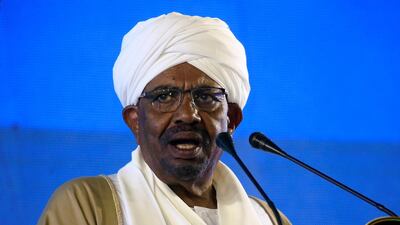The Sudanese-Eritrean border will be reopened, Sudan's embattled president Omar Al Bashir announced on Thursday, as he remained defiant in the face of a popular uprising.
Speaking to supporters, Mr Al Bashir said the border, which has been closed since January 6, 2018, will reopen after more than a year.
"I announce here, from Kassala, that we are opening the border with Eritrea because they are our brothers and our people. Politics will not divide us," he said in televised remarks before scores of supporters in the town of Kassala, capital of the remote state of the same name.
It was unclear at the time why the border with Eritrea was closed, but relations in the Horn of Africa region are warming following a historic reconciliation last year between Ethiopia and Eritrea.
Mr Al Bashir closed the border last year as he announced a six-month state of emergency in the Kassala and North Kordufan regions, with troops being seen along the border.
The Sudanese president has been under immense pressure in recent months amid near-daily widespread protests opposing his regime.
At least 30 people have been killed in the protests, according to the government, although rights group say 45 people have died.
As Mr Al Bashir was speaking, the Sudanese Professionals' Association, a group leading the protests called for fresh rallies in cities across the country.
Mr Al Bashir has ruled Sudan for three decades, but demonstrations in a farming town against the government's decision to triple the price of bread have become the biggest threat yet to his regime.
Defiant in the face of the protests, Mr Al Bashir ridiculed those using social media to organise protests against his regime.
"Changing the government and changing the president will not be through WhatsApp nor Facebook, but will be through the ballot box," he said. "This is our pledge and commitment before the Sudanese people...The decision is your right, the masses of the Sudanese people."
Activists have documented the protests extensively through social media and have reported difficulty accessing Facebook and Twitter, claiming the government is blocking access.
The Sudanese Professionals' Association has used hashtags such as #Sudan_cities_uprise to help gather momentum to their movement.

